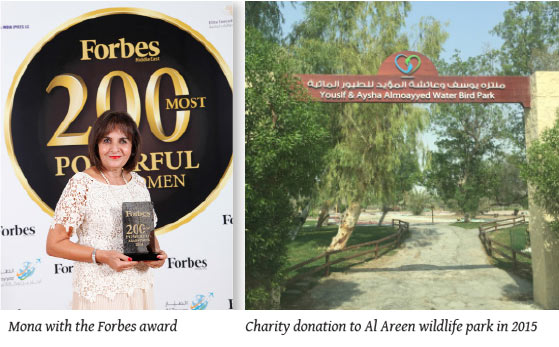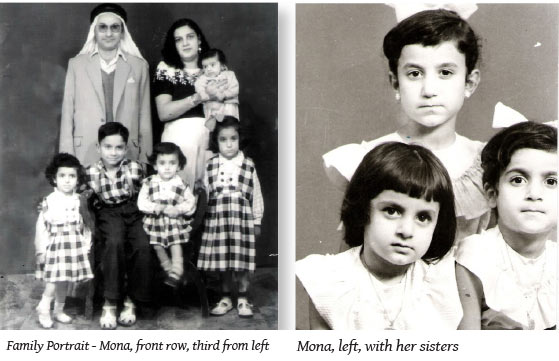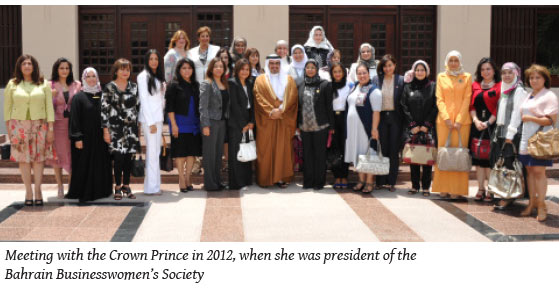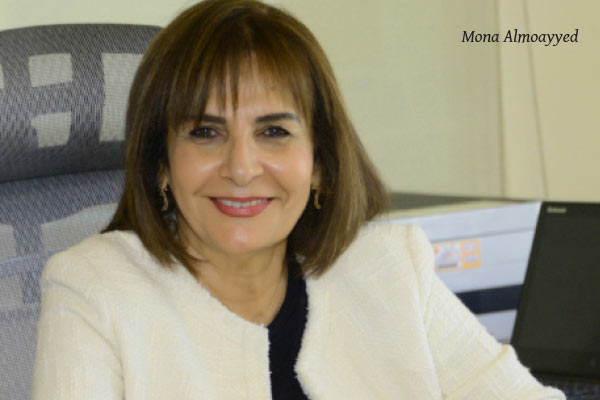Setting an example for women all around the Gulf, Mona Almoayyed added another feather to her cap by making the Forbes Middle East List of Most Influential Arab Women, yet again. She talks to Apple Sharma about her recognition and charitable projects.
Having paved the way for women’s empowerment for decades, managing director of YK Almoayyed & Sons, Mona has been a regular on the Forbes listings. Acknowledging her latest achievement of being number eight on the list this year, she still feels humbled by the whole experience.
“For me, it is an honour to be included in the Forbes list,” she says. “I am happy for myself and for women in Bahrain to be exposed to an international and reliable organisation such as Forbes. Although Bahrain is a small country, there are many influential hard-working women.”
Talking about what this means to her personally, she adds: “This inclusion, for me, is very important. I’ve always worked hard all my life since I finished university. My father really gave us confidence as women; he educated us the same way as our brothers. He always wanted us to work, and my husband is the same. He really believes in women having a career, so even my daughters are all working. So, to me, being recognised in this influential list, it gives me more enthusiasm to work harder and achieve more.”
Coming from a family of business people, it was fairly easy for Mona to get established as a business woman, which she attributes to her father’s forward thinking. “My father really believed in including us in the business,” she explains. “Even in the summer holidays, he used to tell us to come and work in the office because he really didn’t want us to be idle.”

Having studied business administration, Mona joined her father’s business in 1974, straight after university, in the accounts department. Although her father was open-minded, he always felt girls, in the end, have to get married and raise children. But even after marriage and four babies, Mona worked part-time and went back full-time once her children started school. “I was working very hard; I took work back home and proved to my father that I was as good as the boys,” she says.
Her hard work paid off and after two years she moved departments, from accounts to furniture. She travelled all over Europe, managed to improve sales and brought interesting brands such as Ligne Roset and many other famous furniture brands to Bahrain.
After about 10 years, she was put in charge of the automobile division. Of her initial experience, she says: “It was difficult at the beginning because customers and employees didn’t like to talk to me – they preferred to talk to my brother. But I’m talking about the ’80s and ’90s. Now I think it’s getting much easier – people are used to women.”

Of the challenges she faced, one of the biggest was being a woman in a male-oriented job. “Slowly, I felt that people were getting used to me because I am the type of person that, if you give me a problem, I don’t just talk to you and forget about it; I write it down and I really try to solve it. So the customers always like to come to me with their problems because they feel I can do something.”
Managing an organisation of more than 1,000 people and 100 brands, Mona runs a tight ship with professional managers in each department. “We have an executive committee which meets once a month, all the managers report to the committee, and we take decisions,” she says.
”We also have an audit committee which is doing a very good job – examining all the risk factors, how to improve things and how to close loopholes for corruption.”
The company’s HR committee looks after the employees and follows a performance management system to motivate and improve their positions. The quality committee ensures everything runs efficiently and effectively. “We also do a balance scorecard, which is a way to look at the four pillars of the business – profitability, customer satisfaction, innovation and training and the proper processes to run the business,” she adds.
Mona is a big advocate of social work and gets her generous nature from her parents. “I really believe in charity, it comes from my father – he was a huge philanthropist and my mother as well, in her own way,” she says. “I remember when I was little; she used to stitch clothes for the old ladies in the neighbourhood. My grandmother used to do the same. So, all of our family cared about charity work and giving back to society. That’s why, once my father started his business, he used to allocate a small percentage of his profit to charity work, every year – that was the zakat in those days. Of course, now it’s become much bigger – we do the zakat and, on top of it, we do lots of projects for Bahrain because we feel that we have to give back to society.
”I feel we’ve done enough business and now I’d like to divert my attention to social work – try to benefit society and help people and unfortunate countries like Syria and Palestine, and wherever there are horrible stories.”
The Yousif and Aysha Almoayyed Charity, named after Mona’s parents, is involved in various charitable projects, helping the government as well as people in need, from Bahrainis requiring medical assistance that cannot afford to be treated to helping students go to university.

“One of the charities which I’m really proud of is in Al Areen – we are spending money to improve the garden in Al Areen. So many families go there, so we did the landscaping and made it beautiful – it’s called the bird park,” she explains. “Then, of course, we’re going to build a kidney dialysis centre for the government. For the blind, we bought five machines, and recently, we bought a machine for BD50,000 for sickle cell [patients] for changing their blood. Instead of staying in hospital overnight, they can do it in two hours with this machine. We gave it to Salmaniya Hospital.”
At the end of the year, a percentage of the company’s profit is divided into medical, education and various other projects – big and small, including helping other NGOs (non-governmental organisations).
Mona is also the president of the Al Muntada Society, which was initiated in 2000. “It started off as an NGO for liberal thinking,” she says. “Bahrain needs people who can implement new things, it needs transparency, thinking out of the box, how to improve the country, so that’s how we started this society. Then in 2011, after the problems in Bahrain, we felt that Al Muntada was very important to bring people together.” With her term coming to an end soon, she has further plans to involve the younger generation with various programmes and activities.
Having been the chairman of the Migrant Workers Protection Society for three terms, Mona managed to bring in donations from various organisations, and is still active in helping to improve the living conditions in the labour camps.
With future plans of expansion in the Gulf, and personal goals of travelling the world with her husband and spending time with her grandchildren, Mona’s most important advice to women is to not give up, be consistent in their work and strike a balance between work and personal life.
With her father being her greatest role model, along with the rest of her family, Mona is a true inspiration to other women dedicated to achieving their dreams.


































